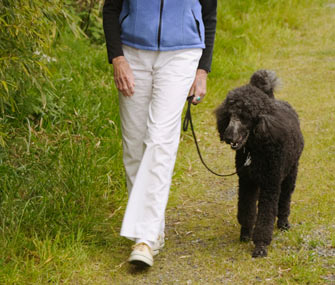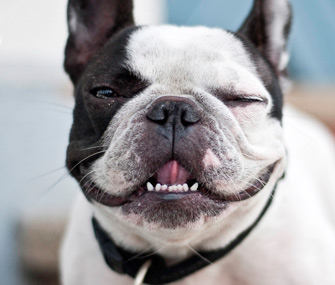The 5 Best Dogs for Your Golden Years
Published on February 04, 2013
Skip To

Like many people in late middle age, I find myself wondering if my next dog will be different. I have long shared my life with retrievers — active, field-bred dogs who throw themselves with joy into every situation (and every puddle of water bigger than a dinner plate). Their boisterousness is infectious: My dogs make me happy. But in 10 years, or 15, or 20, will I be up to the demands of dogs like these?
Or will a nice, quiet little spaniel be the dog I need?
My answer may be different than others, even among people of similar age (55), health (reasonably good) and activity level (decent, could be better). I live in a rural pocket near an urban center, and I can always walk out my back door and engage a bored retriever in a heart-thumping game of fetch in my horse pasture. But I won’t always be able to lift a sick or injured 70-pound dog, and that’s an unchangeable truth. These types of concerns explain in part the increased popularity of small dogs as baby boomers like me approach retirement age.
Smaller May Be Better
So, yes, size does matter when you’re choosing a canine companion for your golden years. But so do energy level and health history. Energy level is important, because if you choose a small dog thinking he’ll be easier to keep exercised and entertained than a large one, chances are you don’t know anyone who has a Jack Russell. And the health history is important in choosing any dog, but especially so when you’re on a fixed income, as most retirees are. The health history may tell you about any preexisting health conditions that your dog may have, but of course, it’s not a guarantee that the dog won’t develop health issues in the future. An easygoing or at least kid-tolerant temperament is also a must, especially if you have grandkids over regularly.Before I start suggesting specific breeds, I have two other recommendations. First, get an adult dog. With an adult dog, you are more likely to have a good idea of health history and temperament, and you’re past the time and money involved in raising a puppy. Second, check out shelters and rescue groups to get a great pet — breed mixes may often have fewer health problems than their purebred counterparts. If you want a purebred puppy, be sure to find a reputable breeder, because if you don’t, you may end up with a poorly socialized dog or a dog with health issues who doesn’t measure up to the full potential of the breed. (You may also be supporting puppy mills if you choose the wrong source for your pup, and you don’t want to do that.)

French Bulldog
Martha Stewart is one of an A-list of celebrity fans of the French Bulldog, a stylish small spark plug of a dog with a solid disposition. While the Frenchie is a brachycephalic breed with all the baggage that comes with that, if you take the trouble to avoid casual or puppy-mill breeders, you’re likely to have fewer health problems. (And do take the trouble: Poorly bred French Bulldogs can have their respiratory systems so compromised by their flat faces that they need surgery to survive.)A healthy French Bulldog is a solid companion, especially if he can be with you all the time. While not exactly known for their athleticism (they tend to overheat easily), if kept fit and trim, the Frenchie is a wonderful walking partner. Sharing the bed may take a little getting used to, though, since these dogs tend to snore. But in the eyes (and ears) of those who love them, that just makes the Frenchie more endearing.
Poodle
There’s a reason why Poodles have remained popular decade after decade, especially with older people. They’re personable, easy to train and have a lively sense of humor (they laugh with you, not at you). They are also relatively clean, low-shedding dogs who are easy to maintain as long as you keep regular grooming appointments (or learn to maintain a short “puppy clip” yourself). The Poodle is part of the original popular crossbreed, the Cockapoo, and the “poo” influence is seen in the names of many others, including the Labradoodle, the dog that kicked off the modern cross-breed craze.The Toy Poodle is very popular with people who want a fun tiny dog, but the miniature may be a better pick if you need a dog who’s a little sturdier and more capable of a good long walk. Trick training is usually a breeze with these dogs, and once trained, Poodles seem to live to keep you laughing.
Schipperke
One of the more long-lived dogs, the Schipperke is a sturdy little breed with an easy-care coat and shoe-button eyes that are always asking, "What next?" If you live with a Skip, the answer could be, “Anything.” Take up kayaking, or buy a sailboat — heck, move onto a sailboat and head for an around-the-world adventure. Equipped with a life-preserver in case he goes overboard, your Skip will love you, because after all, this breed was developed for onboard living, as a ship’s ratter from Belgium.Want to stay on terra firma? That’s fine too. Put in a dog door so your Skip can patrol the perimeter, and plan some long hikes. The Schipperke may be small, but he’s indefatigable. But always keep the leash on: He’s fast, and always ready to show the squirrels just how fast — even if there’s a busy road between him and them.
Maltese
If you want a dog who sheds the least, get a small, long-haired dog and keep your pet clipped short. The Maltese fits the bill here perfectly. Although the Maltese in the show ring is a perfectly groomed, shimmery wave of floor-length white fur, the same fur goes easy-care when the dog is kept clipped short.That’s not the only benefit of the breed, by far. Maltese are in the same general family as many dogs developed solely as companions and lapdogs, such as the Bichon Frise, Havanese, Bolognese and Coton de Tulear. The Maltese and its related breeds (as well as cross-breeds with these breeds in them) are incredibly attentive and tuned in to their owners. As one of the smallest breeds on this list, Maltese are also the most portable — and fragile.

Pembroke Welsh Corgi
If you’re on the more active side, and comfortable with a dog who’s smart, determined and strong-willed, a Pembroke Welsh Corgi might be a good fit. Long known as the dog favored by England’s Queen Elizabeth (who also fancies her Dorgis, a double dose of short-leggedness that’s the offspring of a Corgi and a Dachshund), the Corgi’s strong will is kept somewhat in check by the limitations of those little legs.They don’t seem to be aware of the problem, though, which means you have to do your best to keep your Corgi from injuring that long back. That means stairs for the bed or couch, and ramps for the car. And yes, lifting: Although the Corgi is a relative small dog, he’s no lightweight, especially if you don’t watch his diet. But a better companion for an active life is hard to find, which is why Corgis are the darlings of the equine set, along with the hard-charging Jack Russell.
Again, these are just some general suggestions to get you thinking before you choose a dog who’s no longer a good fit with your current circumstances. We all age differently, with different abilities and expectations, and just as there will be people who take up mountain climbing in their sixties, there will be people in their seventies who do just fine with German Shepherds and Labrador Retrievers. But most of us will probably be happier with a smaller, less demanding dog to keep us company in the final decades of a dog-loving life.
More on Vetstreet:
- Top 10 People-Pleasing Dog Breeds
- 15 Quietest Dog Breeds
- Easy-to-Groom Dog Breeds
- 5 Ways to Keep Pet Hair Under Control
- 11 Small Dogs With Big, Bold Personalities
- Am I a Bad Pet Owner If I Don’t Walk My Dog Every Day?





